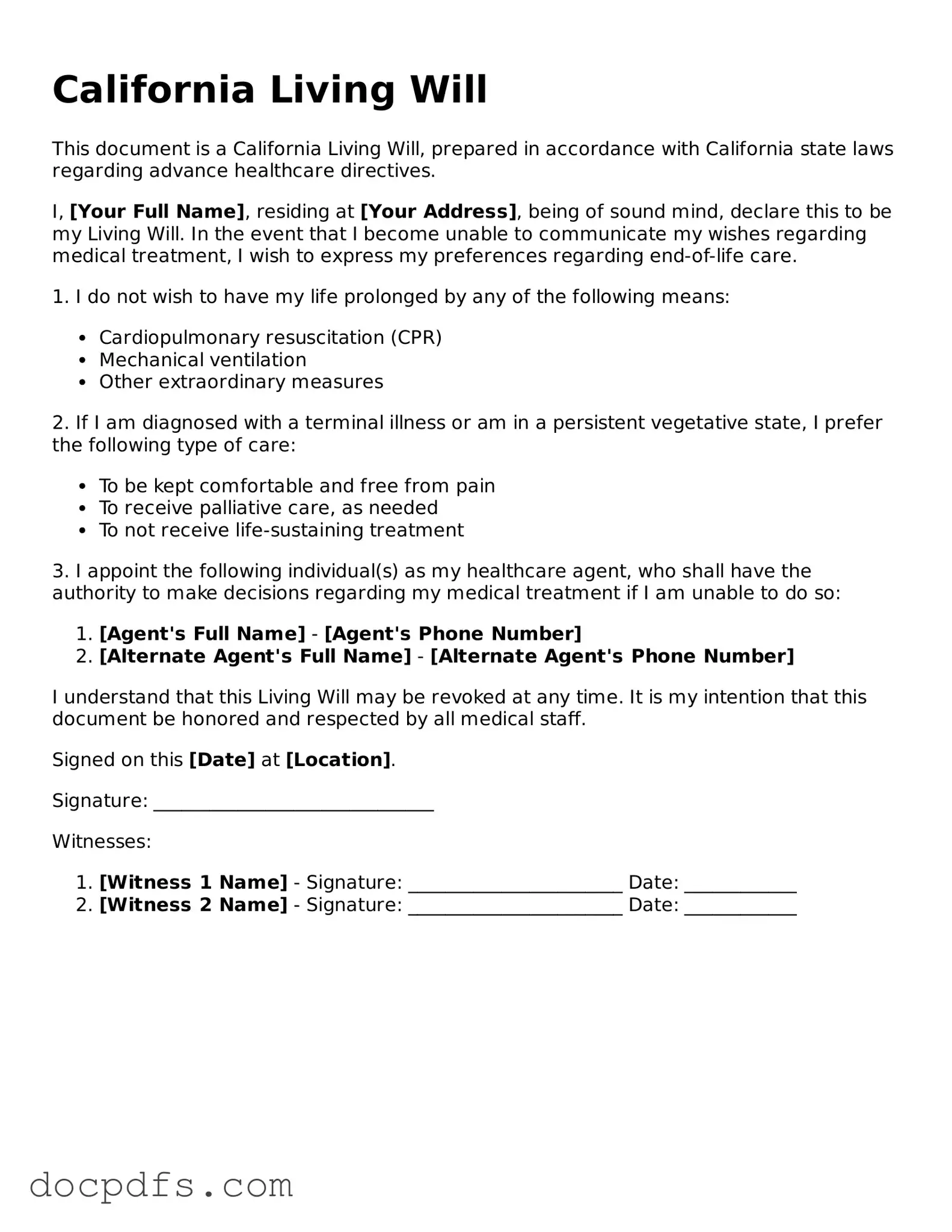What is a California Living Will?
A California Living Will, also known as an Advance Health Care Directive, is a legal document that allows individuals to outline their preferences regarding medical treatment in the event that they become unable to communicate their wishes. This document can specify the types of medical interventions one would or would not want, especially in end-of-life situations.
Who should consider creating a Living Will?
Anyone over the age of 18 should consider creating a Living Will. It is especially important for individuals with chronic illnesses, those undergoing major surgeries, or anyone who wishes to ensure their healthcare preferences are respected. Having this document in place can provide peace of mind for both the individual and their loved ones.
How do I create a Living Will in California?
Creating a Living Will in California involves a few straightforward steps:
-
Download or obtain the California Advance Health Care Directive form.
-
Fill out the form, clearly stating your medical preferences and appointing a health care agent if desired.
-
Sign the document in the presence of two witnesses or a notary public, as required by California law.
Make sure to keep copies of the completed document in accessible places and provide copies to your healthcare providers and loved ones.
What is the difference between a Living Will and a Durable Power of Attorney for Health Care?
A Living Will focuses specifically on your wishes regarding medical treatment, particularly in situations where you cannot express your preferences. In contrast, a Durable Power of Attorney for Health Care designates a specific person to make healthcare decisions on your behalf. While both documents can work together, they serve different purposes.
Can I change or revoke my Living Will?
Yes, you can change or revoke your Living Will at any time, as long as you are of sound mind. To revoke the document, you can simply destroy it or create a new one that states your updated wishes. It’s important to inform your healthcare providers and loved ones of any changes you make.
What happens if I don’t have a Living Will?
If you do not have a Living Will, medical decisions may be made by family members or healthcare providers based on what they believe you would want. This can sometimes lead to disagreements among family members and may not reflect your true wishes. Having a Living Will ensures that your preferences are clearly outlined and respected.
Is a Living Will legally binding in California?
Yes, a properly executed Living Will is legally binding in California. Healthcare providers are required to follow the instructions outlined in the document, as long as they are clear and comply with state laws. It is important to ensure that the form is completed correctly to avoid any potential issues.
Do I need a lawyer to create a Living Will?
While you do not need a lawyer to create a Living Will, it can be beneficial to consult with one, especially if you have complex medical or family situations. A lawyer can help ensure that your document is legally sound and that your wishes are clearly articulated.
How can I ensure my Living Will is honored?
To ensure that your Living Will is honored, take the following steps:
-
Discuss your wishes with your healthcare providers and family members.
-
Provide copies of your Living Will to your doctors and hospital.
-
Review and update your Living Will regularly to reflect any changes in your health or preferences.
By taking these steps, you can help ensure that your medical preferences are respected when it matters most.
What should I include in my Living Will?
Your Living Will should include:
-
Your preferences for life-sustaining treatments, such as resuscitation and mechanical ventilation.
-
Specific instructions regarding pain management and palliative care.
-
Any other medical interventions you do or do not want.
-
The name of your healthcare agent, if you choose to designate one.
Being clear and specific in your wishes can help prevent confusion and ensure that your desires are honored.

